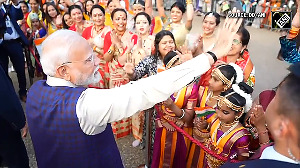''COVID-19 and diabetes have a very intricate relationship.'
'People with diabetes tend to get the most severe forms of COVID-19.'
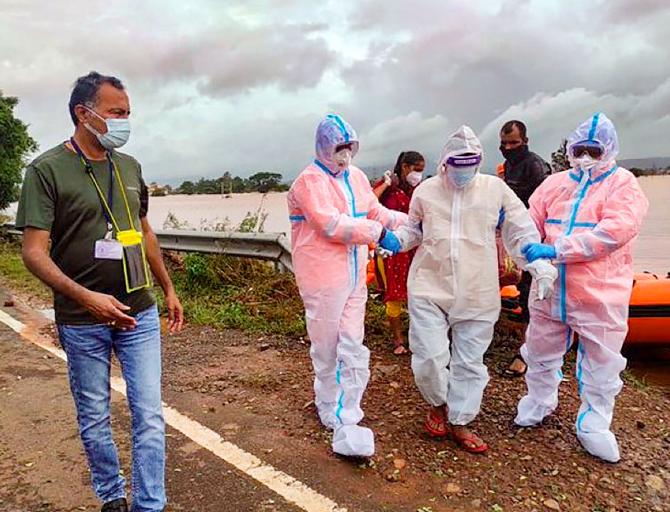
Are you diabetic?
Or pre-diabetic?
Do you have a genetic predisposition to eventually contract diabetes, maybe because one or both your parents were/are diabetics.
Endocrinologist Dr Ambrish Mithal explains the risks those suffering diabetes must worry about with respect to COVID-19.
Even if you are vaccinated.
But while the perils from COVID-19 are much higher for diabetics, COVID-19 is known to bring on diabetes, in those who never had the disease earlier.
We can't know our genes intimately. Or read our genetic tea leaves.
A good health routine, therefore during COVID-19 times -- be we now post first wave, mid-second wave or pre-third wave etc whatever -- is a must.
Chairman and head of endocrinology and diabetology at New Delhi's Max Healthcare hospitals, Padma Bhushan awardee Dr Mithal, who has had affiliations at one time or another with Harvard, WHO and top medical bodies, is a leading diabetes specialist in the country.
In this second part of the interview he discusses with Rediff.com's Vaihayasi Pande Daniel that if you keep chronic disorders in check, the impact of COVID-19 on the population can be minimised.
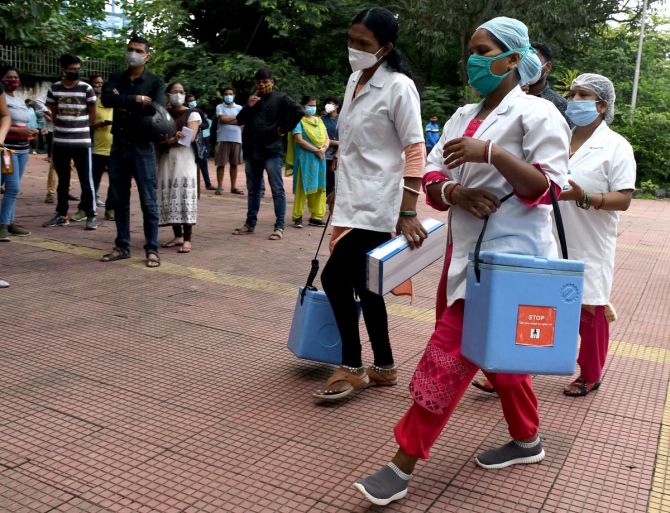
There is a certain lack of interest in COVID-19 right now. As a reporter I know that. People don't want to read any more about it. They are fed up. They don't want to know any more. That's a potentially dangerous situation. Pandemic fatigue is at its highest -- it's an epidemic in its own right.
There is a serious concern about that.
We have to balance it out because there's a question of people's mental health.
People have been locked in for more than a year.
Some people have lost their livelihood.
Some, of course, lost loved ones.
People are going nuts. They don't want to lead a life like this.
Some will go to the extent of saying: 'I don't really care what happens. I'm going to go ahead and do this or that'.
There is undoubtedly pandemic fatigue. It is natural for that to happen.
The key is to learn to balance, which means we do need to carry on our necessary essential activities (to protect ourselves from COVID-19). But we do clamp down on avoidable exposure.
People -- those who are very careful -- are still spending a lot of time sanitising stuff that comes in, or even food that they order.
The spread of the COVID-19 virus by fomites (materials that can spread germs) or the spread by touch is quite uncommon.
If you wash your hands carefully, the chances of the virus spreading through touch or surface is very, very low as compared to other mediums of spread (like breakouts caused by indoor socialisation)
Last year we went like crazy in the hospital trying to spray every table, every chair. God (laughs). Washing our clothes after going out -- all that is nonsense.
We know that that's not a (significant) source of spread. We have learned about the virus. Efficient masking. Avoiding indoor meetings as far as possible. And if you do meet indoors, avoiding eating together, unless everyone is vaccinated. That's the way to go on with our lives -- what else can you do?
For those people who have chronic diabetes what harm can COVID-19 do? For those who are vaccinated, with either one or two doses, and who have chronic diabetes, what damage can COVID-19 do?
What are the precautions these people specifically must take, even if they are vaccinated?
COVID-19 and diabetes have a very intricate relationship. People with diabetes tend to get the most severe forms of COVID-19.
It's not yet proven whether people with diabetes are more prone to the risk of contracting COVID-19. If you are a diabetic, your risk of catching the virus may not be higher, or it's at least unclear, as of now.
But the fact is that if you do catch the virus, then your chances of getting into more complications are there, undoubtedly.

Even if you are vaccinated?
You have to compare people with diabetes to people without diabetes, with the same level of vaccination.
If you're comparing two people -- both have had one shot of the COVID-19 vaccine -- one is a diabetic and the other is not a diabetic, then the one with the diabetes has a greater chance of getting into trouble. The chances go up for someone who's unvaccinated and a diabetic.
That is: If you're a diabetic and you have had one vaccine, your chances of poorer outcomes are lower. If you have had two shots, it's even lower. But it's still greater than someone who's not a diabetic.
Either way?
For every situation, it's a different curve of risk.
It's like two parallel curves running:
If I'm not a diabetic and have had two shots of the vaccine, then, of course, my chances of contracting infection are less, but even if I get it, my chances of getting into serious disease are, let's say, very, very low.
If I'm a diabetic, yes, my chances are lower than if I was not vaccinated. But they may not be the same as someone who doesn't have diabetes.
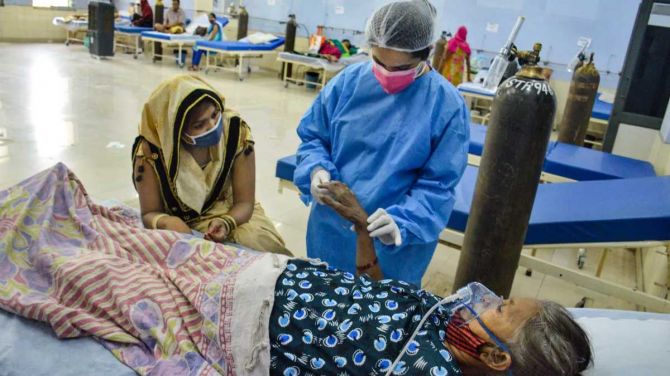
Supposing as a diabetic you got COVID-19 and your diabetes got aggravated, is it as important to also see a long-haul COVID-19 specialist, along with your endocrinologist? Or should one simply look for a good diabetic specialist?
There are two things here.
Number one, if you do get COVID-19, and if you are a diabetic, there is a huge flare up of diabetes that is related to the virus itself. But it could also be related to the steroids that are used in its treatment.
So, as a diabetic, if you do get COVID-19, then coming back to baseline can be a challenge, and you may take some time to get back to how you were (pre-COVID-19) and it doesn't happen immediately. You may not have control over your sugar and it may continue to misbehave for a while.
Secondly, the post-COVID-19 effects also, of course, linger on a lot, especially in people with diabetes, who are struggling with many issues already.
We don't think of diabetes as one disorder, which is just raised blood glucose. We think of diabetes as a marker of health. Someone who has high blood glucose is likely to have hypertension, likely to be obese, likely to possibly have heart disease, likely to have some kidney morbidity. There's a whole bunch of things that comes along with diabetes.
It's the people, who have this constellation of health issues, that leads to other problems (when faced with COVID-19), rather than just a raised blood glucose alone. Although raised blood glucose is also important.
The effects multiply exponentially, if there are multiple comorbidities, which is often the case with diabetes.
Coming back to the post-COVID-19 health situation in a diabetic, most of the time an endocrinologist managing the diabetes can easily manage the post-COVID-19 scenario, unless it's hit a particular organ, where he requires another specialist.
For example, your post COVID-19 symptom may be mainly pulmonary, then you may be seeing a pulmonologist too.
But not all post-COVID-19 people need to go to multiple people. It depends on what kind of post-COVID-19 syndromes they're having.
Long-haul COVID-19 might become a specialty in itself because there's so many side medical issues that arise out of COVID-19?
Yes, you are right.
But I think it will be a part of internal medicine. It will be the same way we deal with chronic disorders.
Like every specialist, a medical specialist also does internal medicine, and there are some doctors who just do internal medicine. Doctors who are internal medicine specialists will take care of long-haul COVID-19 issues.
We as endocrinologists also function as primary care or internal medicine specialists, many a time, for our patients, because we become their primary point of contact.
For COVID-19 it's the same thing: Like I would treat any other diabetic with chronic problems, I would treat the long-COVID-19 the same way. And if there is any involvement of other system, where I need other specialists, I would involve them.
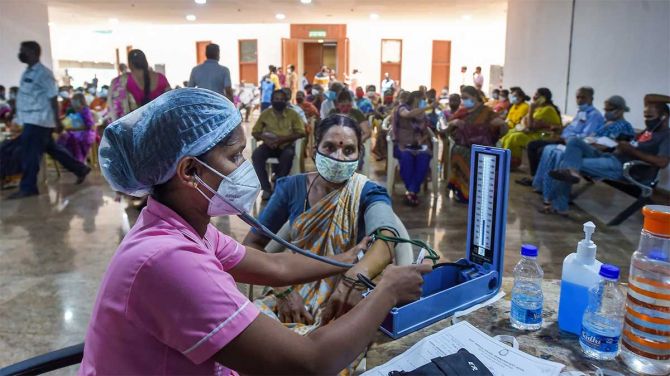
In India, people often take diabetes and pre-diabetes very lightly, till COVID-19 hits them.
One knows a lot of people who became diabetic after suffering COVID-19 and they didn't take their pre-diabetic conditions seriously ie borderline sugar levels etc
What does this subset of people -- especially pre-diabetes people or those with a predisposition to become diabetic - need to do, in terms of diet or anything else, in order not become victims of diabetes post-COVID-19?
The same measures that you would do, if you were just a diabetic. You just have to be most careful about your diet control, control of blood pressure, regular testing, taking your medicines. Those are the basics.
Post-COVID-19 outcomes are also related to your level of control of your diabetes. If someone is poorly controlled diabetic, then the outcome of COVID-19 is much worse than someone who is really well controlled.
If you have been careless in the past, you should use this opportunity to reboot your system, get into the act and make sure that in the future, diabetes doesn't come in the way (or cause complications) if you get COVID-19.
It's like -- I often use this phrase, which I actually first read in The Lancet -- this is actually a syndemic.
A syndemic means it's a combination of a viral pandemic, with a diabetes pandemic.
That's interesting.
Let's say you have two populations -- one has a diabetes prevalence of 5 per cent and the other has a diabetes prevalence of 25 per cent. Both populations are exposed to COVID-19. But you will find much greater impact in the population that has diabetes five times higher.
If you keep these chronic disorders in check, the impact of COVID-19 on the population can be minimised.
 IMAGE: Dr Ambrish Mithal. Photograph: Kind courtesy Dr Ambrish Mithal
IMAGE: Dr Ambrish Mithal. Photograph: Kind courtesy Dr Ambrish MithalApart from what you said, ie testing and monitoring blood pressure and all that, does that mean, even if you are not diabetic yet, though you might have a genetic predisposition, you should still follow dietary restrictions as if you are a diabetic, because COVID-19 is lurking around?
Well, not really like that.
But what we advise to people with diabetes is what we will advise everybody.
It's following a healthy diet. There is nothing dramatically different about the diet of someone who has diabetes, unless it's someone with very severe diabetes and that's a different story.
By and large, the diet that people with diabetes follow should be the diet that everyone follows. Basically, cut down on refined carbs, cut down on fried food, increase your fibre and protein. Those things are not different.
What we say today is the same thing that we have been saying all the while and people haven't listened -- that if your diabetes is not in control, your eyes will get affected or your kidneys will get affected etc.
Maybe they we will listen more, because they feel: 'Oh, my God, I might get more severe COVID-19'. COVID-19 is more sort of immediate. While the other things seem very remote, far away -- long term complications.
Maybe people will use this as an opportunity to control their diabetes.
Or if they are not diabetic, avoid going down that path by making sure they don't put on weight, making sure that they're doing 30 minutes of some exercise every day, making sure they are eating healthy, making sure they are healthy overall. If they are generally healthy the impact of COVID-19 will be less.
- PART III: 'Normalcy is far away'
Feature Presentation: Ashish Narsale/Rediff.com









